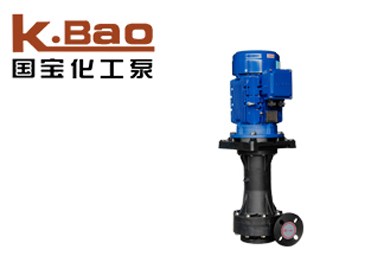
Discussion on the key points of common vertical chemical pump medium selection
1. As a strong corrosive medium, sulfuric acid is an important industrial raw material widely used. Sulfuric acid with different concentrations and different temperatures has great differences in corrosion of materials. Carbon steel and cast iron have good corrosion resistance to concentrated sulfuric acid. The concentration is above 80% and the temperature is less than 80 °C, but it is not suitable for high-speed flow of sulfuric acid. Not applicable to pump valve materials; common stainless steels such as 304 (0Cr18Ni9) and 316 (0Cr18Ni12Mo2Ti) are also limited to sulfuric acid media. Therefore, the vertical chemical pump for transporting sulfuric acid is usually composed of high-silicon cast iron (difficult to cast and process) and high-alloy stainless steel (20 alloy). Fluoroplastics have good sulfuric acid resistance, and the use of a fluorine-lined pump (F46) is a more economical choice.
Two.
2. Hydrochloric acid is not resistant to hydrochloric acid corrosion in most metallic materials (including various stainless steel materials), while high silicon iron containing Mo can only be used in hydrochloric acid at 50 ° C and below 30%. In contrast to metallic materials, most non-metallic materials have good corrosion resistance to hydrochloric acid, so lining rubber pumps and vertical chemical pumps (such as polypropylene, fluoroplastics, etc.) have good corrosion resistance. It is the best choice for transporting hydrochloric acid.
3. Most of the metals in nitric acid are rapidly corroded and destroyed in nitric acid. Stainless steel is the most widely used nitric acid resistant material and has good corrosion resistance to various concentrations of nitric acid at room temperature. It is worth mentioning that the corrosion resistance of molybdenum-containing stainless steel (such as 316, 316L) to nitric acid is not only better than ordinary stainless steel (such as 304, 321), and sometimes even lower than ordinary stainless steel. Vertical chemical pumps and high temperature nitric acid are usually made of titanium and titanium alloy materials.
4. Acetic acid is one of the most corrosive substances in organic acids. Ordinary steel is severely corroded at various concentrations and temperatures of acetic acid. Stainless steel is an excellent anti-acetate material. 316 stainless steel containing molybdenum is also suitable for high temperature and dilute acetic acid vapor. For harsh requirements such as high temperature and high concentration of acetic acid or other corrosive media, high alloy stainless steel or vertical chemical pumps are available.
5. Alkali (sodium hydroxide) steel is widely used in sodium hydroxide solution below 80 °C and 30% concentration. Many factories still use ordinary steel at 100 ° C and below 75%. Although the corrosion is increased, the economy is good. . The corrosion resistance of ordinary stainless steel to lye has no obvious advantages compared with cast iron. Vertical chemical pumps do not recommend stainless steel as long as a small amount of iron is allowed in the medium. For high-temperature alkaline liquids, titanium and titanium alloys or high-alloy stainless steels are often used.
6. Ammonia (ammonium hydroxide) Most metals and non-metals are slightly corrosive in liquid ammonia and ammonia (ammonium hydroxide). Vertical chemical pumps are only suitable for copper and copper alloys.
7. brine (seawater) in ordinary steel in sodium chloride solution and seawater, the corrosion rate of salt water is not too high, generally need to be protected by paint; the stainless steel of various vertical chemical pumps also has a very low uniform corrosion rate, but it may be Local corrosion caused by chloride ions, usually 316 stainless steel.
8. The common alcohols of alcohols, ketones, esters and ethers are methanol, ethylene glycol, propanol, etc., the ketone medium is acetone, methyl ethyl ketone, etc., the ester medium has various methyl esters, ethyl esters, etc., and the ether medium is A. Ether, butyl ether, and the like. They are basically non-corrosive, and commonly used materials can be applied. Vertical chemical pumps should also be reasonably selected according to the performance of the medium and related requirements.













